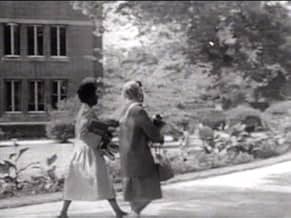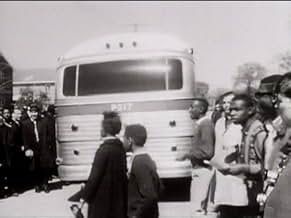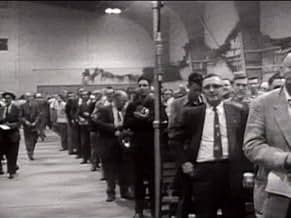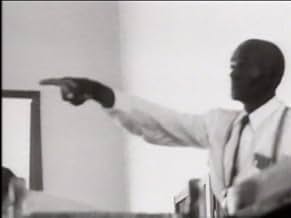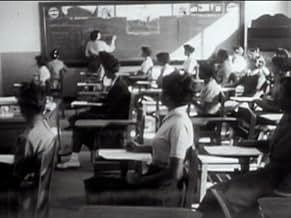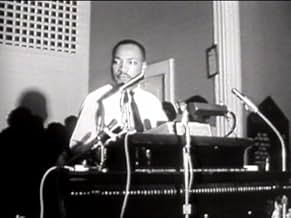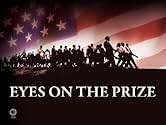A documentary about the American Civil Rights Movement from 1952 to 1965.A documentary about the American Civil Rights Movement from 1952 to 1965.A documentary about the American Civil Rights Movement from 1952 to 1965.
- Nominated for 1 Oscar
- 11 wins & 5 nominations total
Browse episodes
Featured reviews
This series (along with the sequel, "Eyes on the Prize II") is a classic documentary that, in many ways, pointed to the techniques later adapted by Ken Burns in his documentaries. Given the availability of film and first-person accounts, as well as photos, this is a far more moving and affecting film. Beginnings are difficult, and one might quibble with how the first part brings the viewer "up to speed" on African American history before the 1950's, the immediate attention to the story of Emmitt Till makes up for much of that missing narrative, by showing in graphic detail the status of African Americans in the United States, particularly the deep South. The rest of the series fills in a great amount of detail in the ensuing decade up to 1965 and the Voter-Rights act of that year.
Three things to point out in detail that made this a strong film. First, the framing of the narrative before Brown v. Board to emphasize that the Brown case did not come about in isolation, but as part of a broader strategy of the NAACP (if you are further interested in this, you should look at "The Road to Brown") led by Charles Houston and Thurgood Marshall. Second, the film did not solely rely on newsreel footage and interviews, but effectively used still photos to convey drama and set pacing. On that last issue, the third point (which may have been for cost and copyright reasons for all I know) was the minimal use of music in the film. Some of the most powerful moments in the film come from a long (4-5 seconds) shot of a dramatic photo with only silence.
Why only 9 stars and not 10? I would like to have seen a bit more in the lead up to the 1950's, and some emphasis on larger context of the Cold War and such -- particularly a bit more on radical African Americans who were targeted by the state for prosecution before the forties, as well as more on the legacies of W.E.B. Dubois and Booker T. Washington as backdrop for later debates within the movement. These are really historical concerns, and overall, the film is worth seeing. I hope that soon the copyright issues will be sorted out so that this can be released on DVD, as many video copies available now are showing their age after many viewings!
Three things to point out in detail that made this a strong film. First, the framing of the narrative before Brown v. Board to emphasize that the Brown case did not come about in isolation, but as part of a broader strategy of the NAACP (if you are further interested in this, you should look at "The Road to Brown") led by Charles Houston and Thurgood Marshall. Second, the film did not solely rely on newsreel footage and interviews, but effectively used still photos to convey drama and set pacing. On that last issue, the third point (which may have been for cost and copyright reasons for all I know) was the minimal use of music in the film. Some of the most powerful moments in the film come from a long (4-5 seconds) shot of a dramatic photo with only silence.
Why only 9 stars and not 10? I would like to have seen a bit more in the lead up to the 1950's, and some emphasis on larger context of the Cold War and such -- particularly a bit more on radical African Americans who were targeted by the state for prosecution before the forties, as well as more on the legacies of W.E.B. Dubois and Booker T. Washington as backdrop for later debates within the movement. These are really historical concerns, and overall, the film is worth seeing. I hope that soon the copyright issues will be sorted out so that this can be released on DVD, as many video copies available now are showing their age after many viewings!
This is the most comprehensive, detailed, and informative series of any covering the Civil Rights struggles from the early stages through the 1980's. This is a must see for any person looking to get information and insight on what the struggle for equality was like for black people in America. They compile actual footage from historical events, along with interviews with some of the people who were actually there. This series will make you go through a range of emotions as you actually feel of part of the history that you are viewing. Julian Bond, (who participated in many of these events) does a masterful job a narrating the entire series. This is one series that you must have in your collection.
10cbigby
I've seen the original series several times and was taken along for an emotional and intellectual journey on "modern-day" beginnings of the Civil Rights Movement. There is no way I could conceive anyone but a strident racist could not be moved by the sheer simplicity of using the churches as the center to motivate and rally black people. Dr. King is shown as a young minister developing his oratory and the narration is intense. I would have to say that my favorite segment is the at first calm eulogy offered during the funeral following the death of a marcher that becomes angered at the seeming wantoness of murder. It was so impassioned it made me guilty for not being more involved in the Movement as a teen. Buy and watch the series. It will be among the best things you will ever do!
I've watched this dozens of times. It is the most important documentary series ever made. Not even Ken Burns finest work, or Errol Morris, have anything on this series.
FYI The IMDB tagline describes this as a documentary about the Civil Rights movement "1952-1965". It covers 1952 thru the early 1980's.
Surely the original film makers are retired or passed on, but it would be amazing to see a second volume or new episodes of this series. 1980-2020.
FYI The IMDB tagline describes this as a documentary about the Civil Rights movement "1952-1965". It covers 1952 thru the early 1980's.
Surely the original film makers are retired or passed on, but it would be amazing to see a second volume or new episodes of this series. 1980-2020.
In 1987 I saw the Eyes on the Prize series in it's ENTIRETY.
Those too young to remember or those not. Yet born don't know that the history from this documentary is Missing the years following 1965. Why?
The public libraries have removed those years after 1965 from the shelves. Why? I decided to give Part One 10 stars because it is deserving.
Where's Part 2? And Why is it kept from this generation? Tell them. I know exactly Why.. In the series following 1965 there's a shift and split between the King Nonviolent ideologies and SNCC. Stokely Carmichael challenges King
The Watts riots takes place. Nonviolent strategies are questioned by a younger generation. The war in Vietnam is called into question by Dr. King. In 1966 or 7 he visits Cicero in Chicago where he's met with people who are more violent than in the South..
The Black Panther Party arrives in the seen after jung is assassinated. My children...Thank God had the chance to know and learn about the missing documentary. It's unfortunate this generation won't.
Those too young to remember or those not. Yet born don't know that the history from this documentary is Missing the years following 1965. Why?
The public libraries have removed those years after 1965 from the shelves. Why? I decided to give Part One 10 stars because it is deserving.
Where's Part 2? And Why is it kept from this generation? Tell them. I know exactly Why.. In the series following 1965 there's a shift and split between the King Nonviolent ideologies and SNCC. Stokely Carmichael challenges King
The Watts riots takes place. Nonviolent strategies are questioned by a younger generation. The war in Vietnam is called into question by Dr. King. In 1966 or 7 he visits Cicero in Chicago where he's met with people who are more violent than in the South..
The Black Panther Party arrives in the seen after jung is assassinated. My children...Thank God had the chance to know and learn about the missing documentary. It's unfortunate this generation won't.
Did you know
- TriviaThe series was unavailable from 1995 to 2006 owing to copyright issues. Licenses for "Happy Birthday", news footage, various photographs, songs, and lyrics used in the film expired in 1995, and the film company Blackside could not afford to renew these licenses. A grant from the Ford Foundation enabled them to renew the licenses. The series was rebroadcast and released to DVD in October 2006.
- How many seasons does Eyes on the Prize have?Powered by Alexa
Details
- Release date
- Country of origin
- Language
- Also known as
- Eyes on the Prize II
- Production company
- See more company credits at IMDbPro
- Runtime6 hours
- Color
Contribute to this page
Suggest an edit or add missing content



